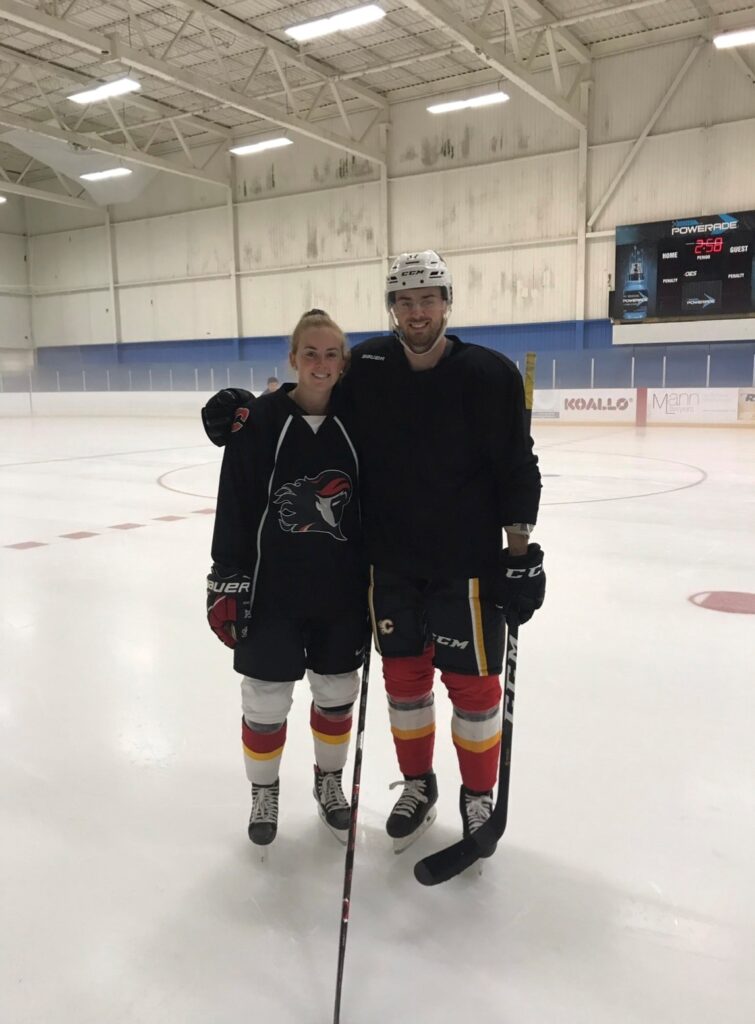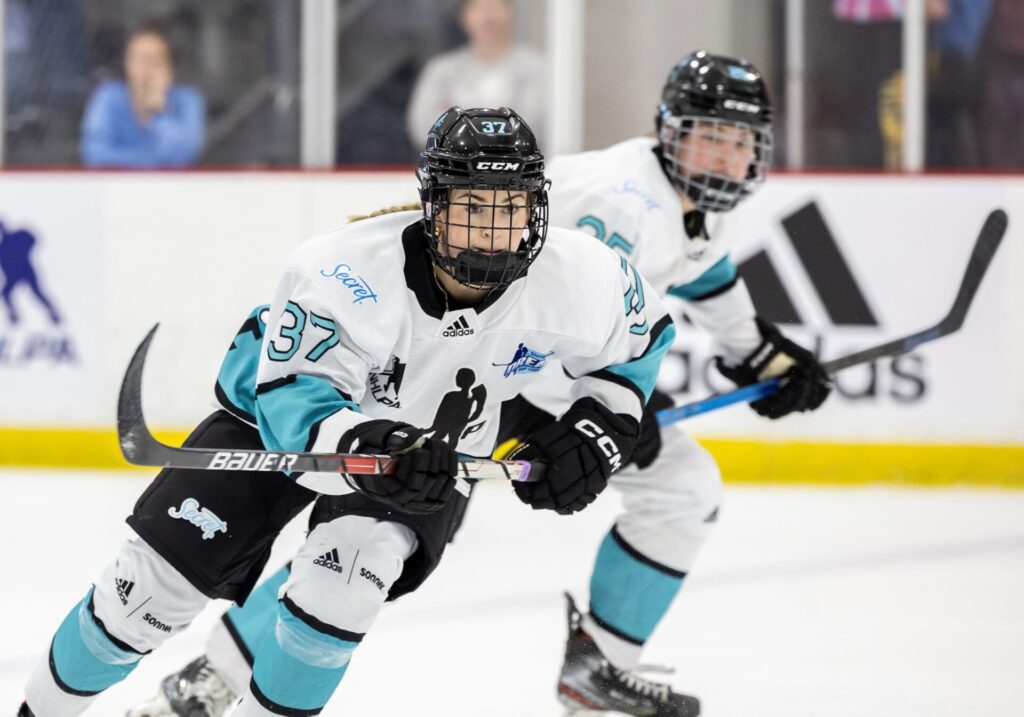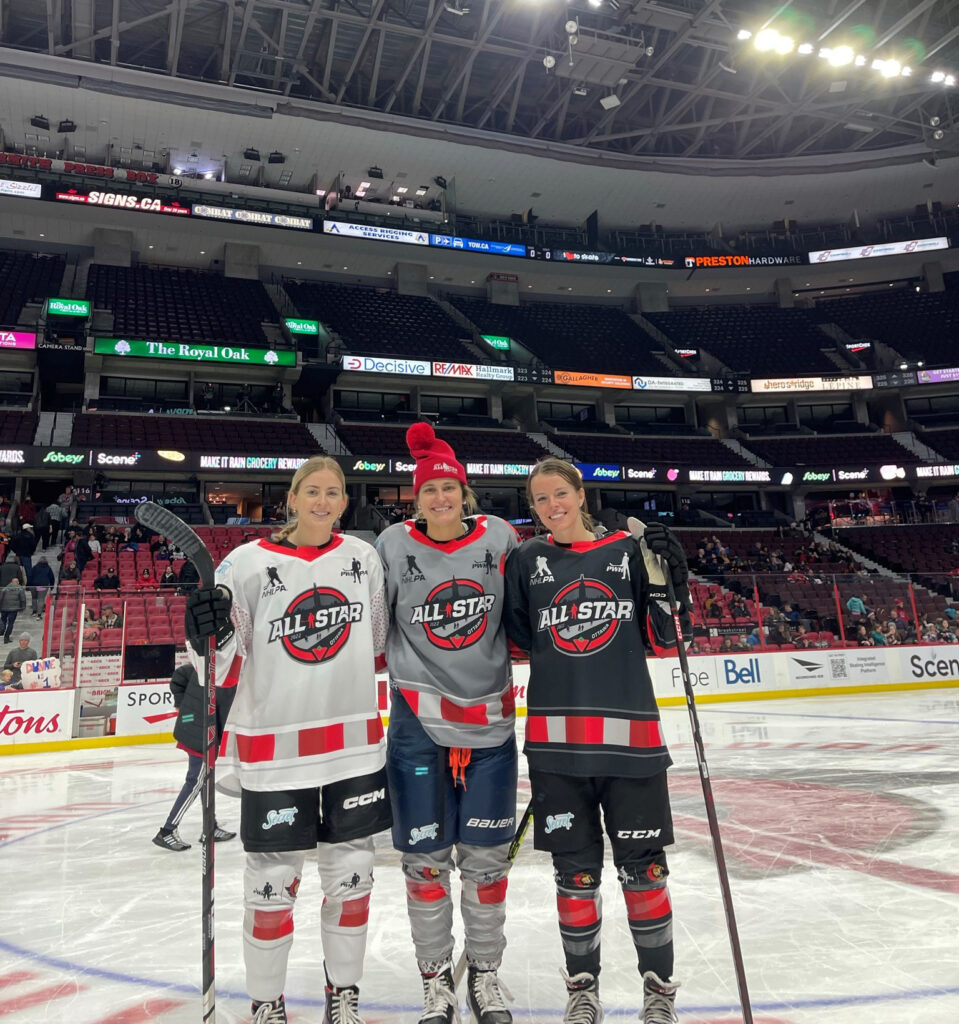When Rebecca Leslie finally heard her name called as the first-ever draft pick for the new Professional Women’s Hockey League in Toronto in mid-September 2023, her eyes filled with tears.
It was partly the excitement of being chosen to play for one of the six foundational women’s pro hockey teams. But it was also because that moment in particular was never part of her hockey dreams.
Sure, the Ottawa native grew up dreaming about playing hockey at a national level, inspired by her brother Zac Leslie (LA Kings 2013 entry draft, now with the Kontinental Hockey League’s Kunlun Red Star.) As a forward, Rebecca excelled with a spectacular university career playing with the Boston University Terriers (171 points in 139 games) and later with the now-defunct Canadian Women’s hockey League, where she was a top candidate.
But for women in the sport, that dream always led to Team Canada and the Olympics. With so few berths available for players on Team Canada, it also meant it was often a pipe dream.
But in that moment, as Rebecca walked up when her named was called at the CBC headquarters, the game changed not just for her, but for generations of girls who have yet to strap on skates.
CAA Magazine sat down with Rebecca Leslie (a young CAA Member!) to talk about growing up with one dream – and living out another.
This interview has been edited for clarity and length.
When was the first time you strapped on skates?
I grew up in Ottawa and started playing hockey when I was four. I have an older brother (Zac Leslie) who played hockey, so I wanted to do everything he did growing up.

Your brother was a big role model for you growing up?
Growing up, I’d tell people, I’m going to be a hockey player, just like my brother. Zac is two years older than me, and a professional hockey player. I’ve always just looked up to him, and we’ve trained together over the years. He’s been a huge part of my career and my journey.
While we had different dreams and different goals, we worked together to achieve those dreams. Mine was always to play in the Olympics or play for Team Canada, where he always wanted to join the NHL.
Have your hockey ambitions changed from when you were younger?
I grew up wanting to play in the Ontario Hockey League. But the dream was to play in the Olympics – and that was my only dream for a really long time. Now it’s exciting to see that there is an opportunity for female hockey players to continue playing [professionally] after university.
How does it feel to be part of the PWHL draft?
It’s super exciting as female hockey players. We put in just as much work and time and commitment as the guys do. So, to finally have the opportunity to be valued as equals, is huge for women’s hockey and woman in sport in general.
There’s been other professional women’s leagues like the National Women’s Soccer League, and they paved the way for women in sports and they’re respected by their male counterparts.
For the most part, NHL hockey players really respect the top female players. This is going to be a great opportunity to work together and grow the game.
How has playing hockey changed since you were in school?
I played division one and I had a class of seven when I graduated, and only two of us continue to play after university. [When I was in school], if you’re not with the national team when you graduate, you might play for one to two years, but you’re not really trying to make a career out of it.
We always joke about retirement for women’s hockey players is 25 years old when that’s not the case for men’s hockey players. Usually, girls don’t even get to their peak performance because they’re retired before that even happens.

Any advice for high school students committing to a women's team?
It’s a really exciting time for girls who are in high school, but even for the next generation in elementary school.
My biggest advice would be to dream big, and just seize every opportunity that comes your way. With [a good] work ethic and the right people around you, you can achieve any goal that you set out. So just to continue to work hard to achieve those goals.
What are the main skills or insights that you gained playing hockey that are going to be valuable going forward?
There are so many lessons that you can learn from being a hockey player. And I think that one thing that’s helped me in my professional career and in relationships is just being a good a good teammate.
I am the type of teammate that people want to be around; I know when to work hard and know when it’s okay to have a little fun.
What is a roadblock you faced while playing hockey?
The one thing that we always talk about is resources. I’ve been playing professionally for a number of years now. And the one thing that we always lacked was the resources, [such as] having a locker room we can comfortably get dressed in and leave our equipment overnight and not have to carry it to our apartments or houses between every session or having an athletic therapist at every practice.
I know a number of girls who learned on YouTube to tape their ankles or their wrists because they never had a therapist there. We often didn’t have tape in our locker rooms, and we’d have to buy our own. So, the little things that you tend to forget about are what you need to prepare to be at the highest level; I think those little resources will help us be successful.

Where do you see yourself in a few years?
I hope to keep playing for as long as I can. The professional league has opened the doors [for jobs in] operations, marketing, coaching and therapy. So that’s another exciting thing too, is you can stay in the game of women’s hockey even after retirement.
What do you think is the distribution of the Western Professional Hockey League (PWHL)?
There have been professional leagues in in Canada and the US for women’s hockey, but they haven’t been successful in providing a livable wage, or the proper resources. So the PWHL is the first league of its kind, but I think it makes sense to have teams in huge hockey markets. Ottawa is also another market that sometimes gets overlooked. We are a huge sports city, and our fans are loyal to their teams.
You’re an Ottawa local who joined CAA this year. How do you like the Everyday Membership?
CAA has really great Member benefits. As a sports fan, the discounted tickets for REDBLACKS, and the 67s and the Sens are huge. Plus, CAA is always there for you when you need them.
Are you a Next Gen CAA Member with a story to tell? We’d love to hear from you! Email us at [email protected]
CAA Memberships start from just $30 a year. Learn more about Memberships at caaneo.ca.
